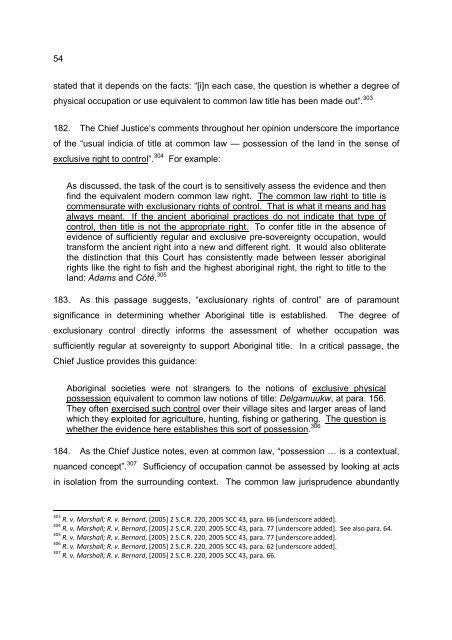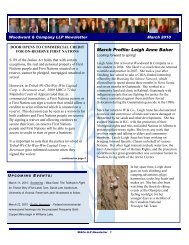Appellants factum - Woodward & Company
Appellants factum - Woodward & Company
Appellants factum - Woodward & Company
You also want an ePaper? Increase the reach of your titles
YUMPU automatically turns print PDFs into web optimized ePapers that Google loves.
54stated that it depends on the facts: “[i]n each case, the question is whether a degree ofphysical occupation or use equivalent to common law title has been made out”. 303182. The Chief Justice’s comments throughout her opinion underscore the importanceof the “usual indicia of title at common law — possession of the land in the sense ofexclusive right to control”. 304 For example:As discussed, the task of the court is to sensitively assess the evidence and thenfind the equivalent modern common law right. The common law right to title iscommensurate with exclusionary rights of control. That is what it means and hasalways meant. If the ancient aboriginal practices do not indicate that type ofcontrol, then title is not the appropriate right. To confer title in the absence ofevidence of sufficiently regular and exclusive pre-sovereignty occupation, wouldtransform the ancient right into a new and different right. It would also obliteratethe distinction that this Court has consistently made between lesser aboriginalrights like the right to fish and the highest aboriginal right, the right to title to theland: Adams and Côté. 305183. As this passage suggests, “exclusionary rights of control” are of paramountsignificance in determining whether Aboriginal title is established.The degree ofexclusionary control directly informs the assessment of whether occupation wassufficiently regular at sovereignty to support Aboriginal title. In a critical passage, theChief Justice provides this guidance:Aboriginal societies were not strangers to the notions of exclusive physicalpossession equivalent to common law notions of title: Delgamuukw, at para. 156.They often exercised such control over their village sites and larger areas of landwhich they exploited for agriculture, hunting, fishing or gathering. The question iswhether the evidence here establishes this sort of possession. 306184. As the Chief Justice notes, even at common law, “possession … is a contextual,nuanced concept”. 307Sufficiency of occupation cannot be assessed by looking at actsin isolation from the surrounding context. The common law jurisprudence abundantly303 R. v. Marshall; R. v. Bernard, [2005] 2 S.C.R. 220, 2005 SCC 43, para. 66 [underscore added].304 R. v. Marshall; R. v. Bernard, [2005] 2 S.C.R. 220, 2005 SCC 43, para. 77 [underscore added]. See also para. 64.305 R. v. Marshall; R. v. Bernard, [2005] 2 S.C.R. 220, 2005 SCC 43, para. 77 [underscore added].306 R. v. Marshall; R. v. Bernard, [2005] 2 S.C.R. 220, 2005 SCC 43, para. 62 [underscore added].307 R. v. Marshall; R. v. Bernard, [2005] 2 S.C.R. 220, 2005 SCC 43, para. 66.



